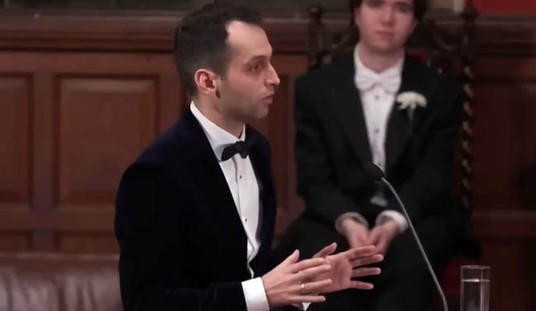Ed touched on this earlier but you should listen to the clip, as it’s surely the single most momentous exchange from today’s momentous hearing. If the mandate ends up being cashiered, this will be its epitaph.
A dirty little secret about Kennedy: He’s not nearly as centrist when it comes to the Commerce Clause and the Tenth Amendment as he is on, say, abortion and gay rights. He’s been the fifth vote for a conservative majority on several landmark cases finding limitations on federal power. I get the idea sometimes from righties who don’t pay much attention to the Court that they view him as another Souter, but that’s not remotely fair. In fact, it’s telling that he begins here by noting enumerated powers. The liberal view of the Constitution on economic regulation is, for all practical purposes, that the only restraint on federal power is the Bill of Rights. My sense of how they imagine those rights is as a sphere that’s been carved out that the feds can’t invade, but as long as they stay outside of it, they can do anything they want. In reality, of course, it’s the feds who are trapped in a sphere. That’s the point of enumerated powers — to lock them inside an area within which they can act but from which they’re not supposed to escape. Everything outside that sphere is reserved for the people and their state governments. (That’s the point of the Tenth Amendment.) Kennedy seems to take that same basic view. It’s entirely possible that he’ll drive a stake through the mandate’s heart.
But it’s also possible that he won’t:
Later on, it would appear that Kennedy had some doubt about whether the health insurance market was, in fact, a unique phenomenon. But near the end of the entire argument, when challengers’ lawyer Michael A. Carvin was at the lectern, Kennedy made a comment that he may have started to see the issue differently.
To understand its significance, the context of this later remark is important. Justice Breyer had again, as he had done several times during the challengers’ argument, stressed that Congress was confronted with a situation in whch some 40 miliion people did not have insurance, and that gap was, in fact, having an effect on commerce that was substantial. “So,” Breyer said, “I thought the issue here is not whether it’s a violation of some basic right or something to make people buy things they don’t want, bujt simply whether those decisons of that groujp of 40 milliion people substantially affect the interstate commerce that has been set up in part” through a variety of government-sponsored health care delivery systems. That, Breyer told Carvin, ”the part of your argument I’m not hearing.”
Carvin, of course, disputed the premise, saying that Congress in adopting the mandate as a method to leverage health care coverage for all of the uninsured across the nation. Kennedy interrupted to that that he agreed “that’s what’s happening here.” But then he went on, and suggested that he had seen what Breyer had been talking about. “I think it is true that, if most questions in life are matters of degree,” it could be that in the markets for health insurance and for the health care for which insurance was the method of payment “the young person who is uninsured is uniquely proximately very close to affecting the rates of insurance and the costs of providing medical care in a way that is not true in other industries. That’s my concern in the case.”
If Kennedy can be persuaded that health care is sui generis, maybe he’ll split the baby by voting to uphold ObamaCare while emphasizing that a mandate for any other industry would be flatly unconstitutional. Not sure how that argument will work — listen to Roberts in the second clip below wonder why a cell-phone mandate would be any different than one for health insurance — but that’s the left’s best hope. Speaking of which, their explanation for today’s disaster appears to be not that they have a weak case on the merits but that Donald Verrilli’s performance was the legal equivalent of fumbling 10 times in the Super Bowl. In fairness to them, some of his exchanges with the Court are painful to read; the liberals on the bench had to bail him out repeatedly. But look: No case of this magnitude is being decided by oral arguments. If you think Breyer and Kagan and Sotomayor and Ginsburg were aggressive in arguing his case for him today, wait until they start going to work on Kennedy behind closed doors. Obama has four very good lawyers on his side in the Supreme Court’s chambers. Verrilli’s performance is unfortunate and terrible optics for O-Care’s superfans, but it’s not changing any votes.
Here’s the full transcript of today’s argument and complete audio. If you have the time, dive in.
Update: Orin Kerr notes the million-dollar phrase in Kennedy’s comments today: “Heavy burden of justification.” He didn’t suggest that mandates are always and everywhere unconstitutional, only that in order to justify using one the feds need to point to some very special and compelling circumstances. The whole question now is whether the allegedly “unique” health-care market is special and compelling enough to get Kennedy to vote with the left.
Update: To see what I mean about the liberal view of the Constitution, read lefty Michael Tomasky wondering why we can’t settle this issue with simple democracy. America elected a Congress that passed a mandate; if the people don’t like the mandate they came up with, let ’em elect a new Congress to undo it. In other words, in lieu of enumerated powers in Article I, he’d apparently let Congress run wild with regulation and leave it to voters to rein them in. That’s a fine idea, and the Court’s ridiculously expansive Commerce Clause jurisprudence sometimes flirts with it, but it’s not the system we have. Enumerated powers mean something or they don’t.









Join the conversation as a VIP Member